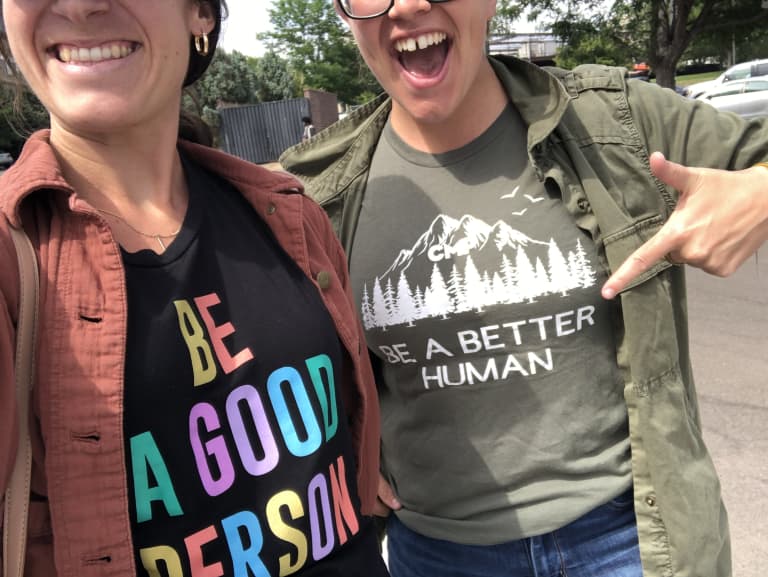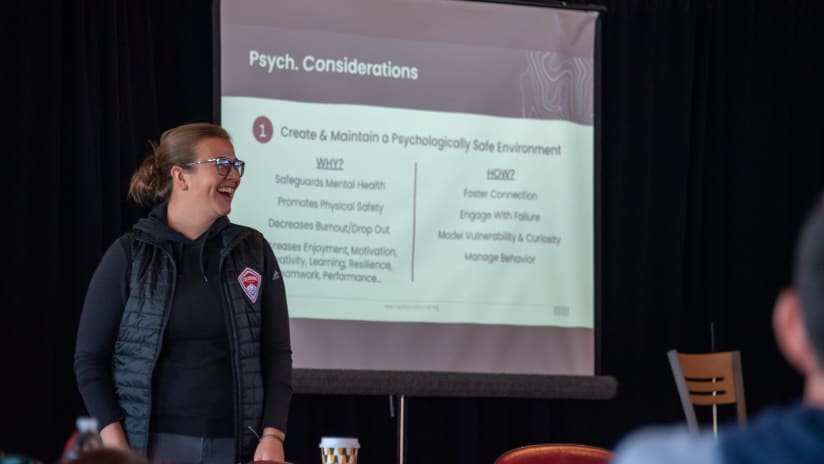Why is it important to talk about mental health?
I look at it from the other angle, which is ‘what are general reasons that you don't talk about things?’. Normally, things that we don't talk about, there's some kind of fear or shame or embarrassment around, and the reality is there shouldn't be any of that accompanying the discussion around mental health. In a lot of groups and in a lot of spaces, there is still a strong stigma associated with discussing this topic. At the end of the day, it’s another really important part of our overall health, just like physical health. We need to be sure that we're taking care of it and tending to it in the same way that we do our physical health. In order to continue that process of normalization of not only formal mental health support, but also the every day tending to our mental health, and to ultimately keep everyone as safe as we can, we need to be more willing and able to talk about it in a really open and non-judgmental manner.
How does mental health weave its way into your job as the Director of Mental Performance?
Sport psychology is really about optimization of performance. I work with our athletes and coaches predominantly on building environments that are going to help cultivate certain psychological skills and hallmarks of interest for our athletes on the field. What I love about my job, is the fact that the skills and competencies that are going to help athletes learn and grow and enjoy and perform really well in soccer, are often extremely transferable outside of that space. So, if we're talking about how to manage the pressure associated with a big game, for instance, that skillset can be applied to any other kind of pressure or anxiety-inducing situation. It’s not always straight across, but if we can support them in cultivating those skills, they will ultimately serve them as people and make them mentally stronger and more resilient on and off the field. Especially for young athletes, sport-directed mental performance training can often function as a less intimidating introduction to the entire world of mental support. With a positive first experience with someone like me, they often feel more comfortable and willing to reach out to a mental health professional down the line if they need it. So, that's another reason why I really love what I do.
What are some of the common mental stressors you see in youth athletes?
There are plenty of things. I think one overarching reality that needs to be named is Gen Z, roughly10-year-olds and up, they grew up in a very different world with different stressors. Because of that, they have different strengths and different growth areas. Considering that against the backdrop of the evolving landscape and nature of youth sports, I see a lot of trouble with failure. I see a lot of high nerves, high anxiety, perfectionistic tendencies, and subpar emotional management skills. Plus, the reality is that a lot of these kids are really, really busy and with that comes a lot of stress. The ripple effects of that are seen both on and off the field. Those are some of the big ones that I run into a lot.

How do you help athletes deal with the pressure of competing at a high level at such a young age?
It's hard. I think the biggest thing for me when I'm working with kids is to really try and involve them in active education around emotional management and coping skills. I work with them on what we do with feelings of pressure – how we process them and when we process them - and how we identify what aspects of that are within our control and beyond our control. We do a lot of work around reshaping their relationship with failure and understanding their intrinsic “why” for soccer. Another huge piece is connection; belonging is massive when it comes to thriving in high pressure environments. I strive to promote as much of that, whether that's within teams or beyond the soccer landscape, as I can. A final piece is addressing the danger of the mentality of ‘soccer is everything’ and ‘soccer is life.’ Even for people who are trying to play at the highest level, the narrative of being nothing without the sport and ignoring the other pieces of their life that make them who they are can create even more pressure and struggle. The earlier that we can cultivate a clear identity outside of soccer, the better it will be for the athlete within and beyond the game.
What mental health resources would you like to see in the future of youth athletics?
I think if we as coaches and staff can cultivate psychologically safe environments for athletes, that is a massive protective and proactive action when it comes to safeguarding mental health. I would love to see an understanding of psychological safety, and what it looks like to build psychologically safe environments in sport. We're getting there. I think that the fact that I have a job in a youth soccer club and am, myself, a resource for our athletes, coaches, and families is a statement in and of itself. I'll be eager to see more of those positions pop up as time goes on, across the country, and across different types of sport. Ultimately, though, I think one of the bests things we can do is have coaches who are psychologically informed, who are considerate of the psychological factors at play for youth athletes. You don't need to be formally trained, that's not what we're asking. I would just like to see coaches who have an informed awareness around the mental factors of the game, and involve trained professionals when appropriate, similarly to how coaches currently operate when it comes to strength training, agility, injury rehab, nutrition, and the like. Lastly, we need to see increased accessibility to mental health resources across all demographics.
In what ways do you work on maintaining your personal mental health?
You have to take care of yourself before you can be effective for anybody else. That's something that I continue to learn as I do the work. From a more formal standpoint, I have a counselor that I meet with once a month or more if I need it, which sometimes I do, just to check in, in the same way I would do a physical check in with my doctor every now and again. Maybe nothing is particularly wrong, but I just want to check up and check in with somebody who I have a relationship with and that is trained to provide support. I also need to set good boundaries around work. That's really big for me. I need to get enough sleep. If I don’t do that, both my physical health and my mental health are going to deteriorate. So, there's that level of basic needs, and then there's the smaller informal stuff. I need to connect with people that I have meaningful relationships with every day. I need to check in with my own personal values and make sure that I'm living in a way that's aligned with them. I need to go to karaoke once every two weeks. I need to dance and give myself time to recharge by myself, to read a book or go on a walk. I say that to demonstrate taking care of your mental health isn’t always formal and structured. It can look like going to a counselor and it can look like taking care of your body, connecting with others, and doing everyday things you know are good for you.

